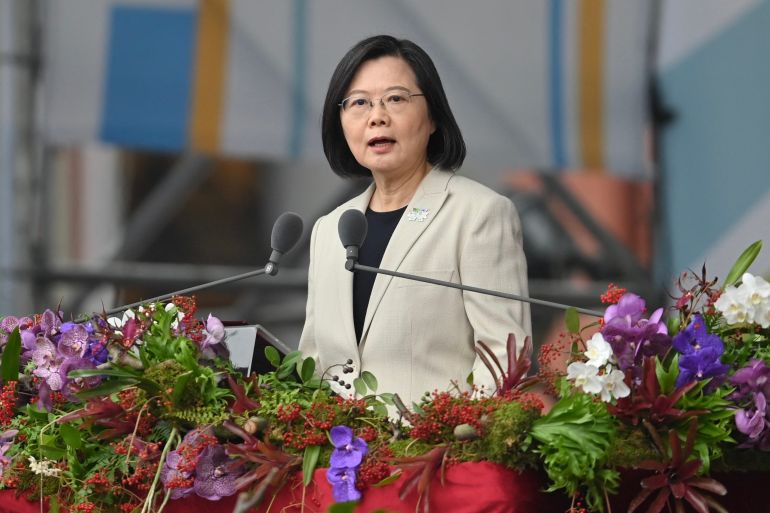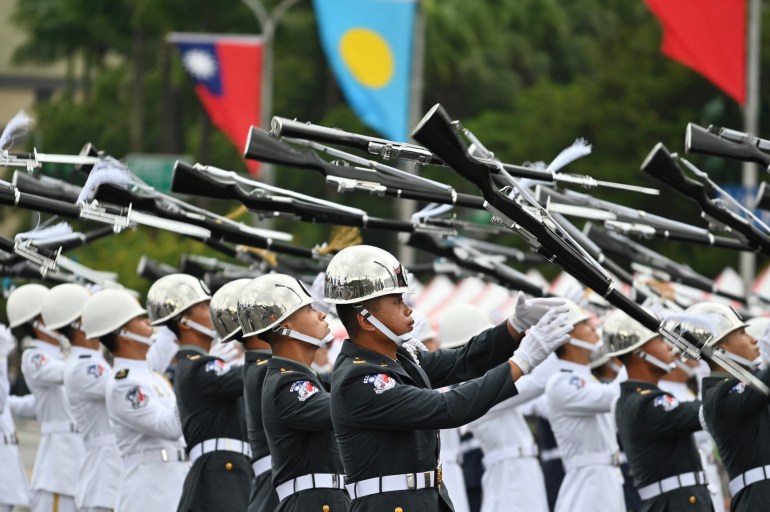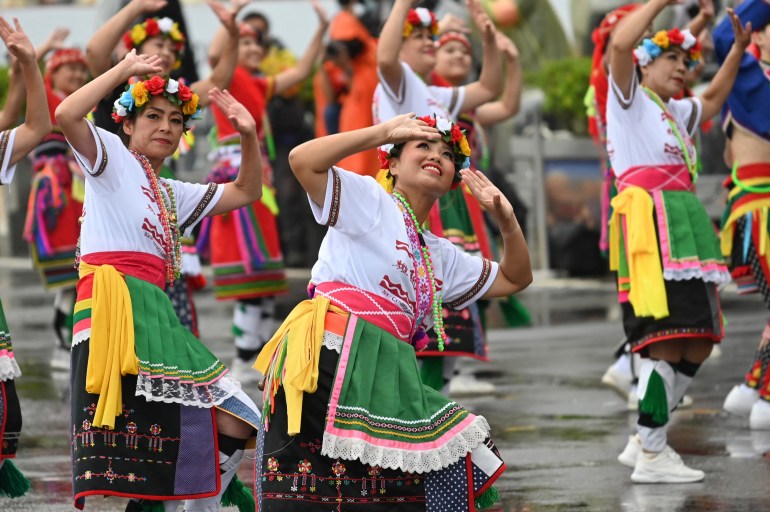Taiwan’s Tsai says can be ‘no compromise’ on democracy or freedom
Speaking on the island’s national day, the president says the people of Taiwan have developed their own sense of identity.

Taiwan will never give up its democratic way of life, President Tsai Ing-wen has told thousands of people gathered for the self-ruled island’s national day, stressing that the government would continue to bolster Taiwan’s defences.
The island, which China claims as its own, has come under increasing military and political pressure from Beijing, especially since Beijing staged unprecedented war games in early August following a visit to Taipei by US House of Representatives Speaker Nancy Pelosi.
Keep reading
list of 4 itemsRussia-Ukraine war: List of key events, day 797
ICJ to hear Mexico’s dispute with Ecuador: All you need to know
Philippines and China in new confrontation at Scarborough Shoal
Tsai, standing in front of the presidential office beneath grey skies, said it was “regrettable” that China had escalated its intimidation and threatened peace and stability in the Taiwan Strait and region.
China should not think there is room for compromise in the commitment of Taiwan’s people to democracy and freedom, she said.
“During the past 73 years, the people of Taiwan have lived and grown together on this land, and have formed our own strong sense of identity and belonging,” she said.
“The broadest consensus among the Taiwanese people and our various political parties is that we must defend our national sovereignty and our free and democratic way of life. On this point, we have no room for compromise.”
Any conflict over Taiwan could drag in the United States, Japan and perhaps much of the world, and further undermine growth in a global economy, already strained by Russia’s war in Ukraine and China’s “zero-COVID” policy.

Tsai drew parallels with Russia’s February 24 invasion of its neighbour, Ukraine.
“We absolutely cannot ignore the challenge that these military expansions pose to the free and democratic world order,” she said.
“The destruction of Taiwan’s democracy and freedom would be a grave defeat for the world’s democracies,” she added.
‘Standing firm’
China’s nationalist government established itself in Taipei after losing the civil war to the communists in 1949.
A military dictatorship for much of the post-war era, Taiwan has since emerged as one of Asia’s most vibrant democracies.
Beijing, however, claims the island as part of China and has not ruled out the use of force to achieve this.
It accuses Tsai, who was first elected in 2016 and returned to office in a landslide four years later, of being a “separatist” and has refused to speak to her.
Tsai says only the 23 million people of Taiwan can decide on their future.
An official familiar with Tsai’s thinking, speaking on condition of anonymity, told reporters the president was looking to “clearly convey” her position to the world and Beijing.
“Standing firm on the status quo of peace and stability in the Taiwan Strait is the main axis of Tsai’s comments on cross-strait relations this year,” the official in Taipei said.
China’s ruling Communist Party is due to begin a congress on Oct 16 that is expected to endorse President Xi Jinping for an unprecedented third term.
Xi has made taking Taiwan a key component of his landmark “national rejuvenation” project.
Tsai has made strengthening Taiwan’s defences a priority of her administration at a time when Beijing is also undertaking an ambitious modernisation programme of its own.
In August, weeks after Beijing held military drills that encircled the island, Taipei announced a double-digit jump in defence spending to a record 586.3 billion New Taiwan dollars ($19.41bn), or about 15 percent of total government expenditure.
She has talked previously of developing an asymmetric “porcupine strategy” to enable it to better respond to the threat posed by Beijing and reiterated the point on Monday.
“We are ramping up the mass production of precision missiles and high-performance naval vessels,” she said.
“In addition, we are working to acquire various small, highly mobile precision weapons that will help us develop comprehensive asymmetric warfare capabilities, ensuring that Taiwan is fully prepared to respond to external military threats,” she added.

Tsai also reiterated the need to mobilise and train more civilians to work with the military, a strategy that Ukraine successfully adopted after Russia’s invasion.
“Every citizen is a guardian of our nation,” the president said.